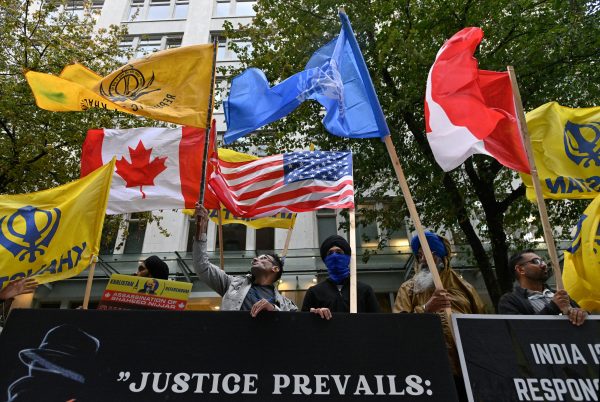New Delhi’s request that Canada repatriate 41 diplomats from India by 10 October 2023 marked another escalation in the two nations’ ongoing diplomatic crisis. India cited the principle of diplomatic parity as the basis for the demand.
Canada did not withdraw its diplomatic staff by the deadline and instead opted to engage in discreet negotiations with India in an attempt to resolve the crisis. On 19 October, following unsuccessful efforts to persuade India, 41 Canadian diplomats departed in response to New Delhi’s threat to revoke their diplomatic immunity. Canada is not taking retaliatory measures in response to this new development.
The diplomatic crisis erupted following Canadian Prime Minister Justin Trudeau’s explosive allegation of Indian involvement in the killing of pro-Khalistan leader Hardeep Singh Nijjar, who was killed in British Columbia in June 2023. Canada expelled a senior Indian diplomat, prompting India to reciprocate by expelling a Canadian diplomat. New Delhi also issued travel warnings to its citizens in Canada and suspended visa services, adversely impacting the Indian diaspora in Canada. Recently, India resumed partial visa services which is a positive sign towards de-escalation.
Trudeau reinforced his allegations during a press conference in New York, where he was attending the United Nations General Assembly. He called on India to cooperate with the investigation amid strained diplomatic relations.
Revelations in the Canadian media have significantly bolstered the strength of Trudeau’s claims. Reports indicate that some of the evidence supporting the allegations — which includes human intelligence and intercepted communications between Indian diplomats — was shared by Five Eyes allies, an intelligence sharing network which includes the United States, the United Kingdom, Canada, Australia and New Zealand. The Indian government has dismissed allegations of Indian involvement in the killing as ‘absurd’.
India maintains that Canada did not share any specific information related to Nijjar’s killing. But media reports from anonymous Canadian officials have revealed that Indian officials did not deny the existence of this intelligence in private discussions. Justin Trudeau raised this issue with Prime Minister Modi during the 2023 G20 Summit in New Delhi. Canada’s National Security and Intelligence Adviser, Jody Thomas, has visited India twice since August to discuss the matter with her Indian counterpart. Reports suggest that US President Joe Biden also raised the issue with Prime Minister Modi at the G20 summit.
Canada hosts the world’s largest Sikh diaspora, and some within it have supported the Khalistan movement. India perceives Sikh support for an independent state of Khalistan as a severe threat to its sovereignty and territorial integrity and has repeatedly voiced concerns about Canada’s perceived leniency towards Sikh extremism and terrorism. Ottawa defends the right to freedom of expression in democratic societies, emphasising that peaceful protests are within the boundaries of this democratic framework.
The United States has made it clear that it is working closely with Canada and is deeply concerned about these allegations. US National Security Advisor Jake Sullivan has rejected media reports suggesting a divide between the United States and Canada, emphasising that the United States takes this matter seriously. During a meeting with Indian Foreign Minister Subrahmanyam Jaishankar, US Secretary of State Antony Blinken urged India to collaborate with the Canadian investigation.
India is a critical partner for Canada and its allies in their Indo-Pacific strategies, sharing democratic values in their struggle against authoritarian regimes like China’s. India is grappling with the looming threat posed by China’s military incursions into disputed regions along the Indian border. Given Beijing’s superior military and economic might, India alone cannot counter the Chinese threat and needs support from Western countries.
New Delhi should strengthen its relations with Western countries and reinforce its democratic credentials, which underpin its strategic relationships. India’s democratic backsliding has raised concerns about authoritarian trends under the Modi government. India’s alleged involvement in the assassination of a pro-Khalistan leader in Canada demonstrates New Delhi’s assertive foreign policy.
This occurs at a pivotal juncture when India’s democratic allies are trying to consolidate their Indo-Pacific strategies. The incident has sparked apprehension regarding the possibility of India taking similar actions in other countries, notably the United States, the United Kingdom and Australia. These nations also host substantial Sikh diasporas with sympathies for the Khalistan movement.
Canada views India’s suspected role in the killing of a Canadian citizen on Canadian soil as a serious infringement on Canadian sovereignty. If India maintains its innocence and has nothing to conceal, it should actively cooperate with Canada in the ongoing investigations. If it is proven that Indian officials were involved, New Delhi must take action to ensure the perpetrators face justice.
The 2018 murder of US citizen Jamal Khashoggi, who was critical of the Saudi regime, serves as a precedent. Despite strong strategic and economic ties between the United States and Saudi Arabia, Washington pursued justice for its citizen’s murder. Initially, the Saudi regime denied involvement, but under pressure from the United States, acknowledged its role and cooperated in the investigations. This cooperation ultimately led to the conviction of eight individuals.
Democracies must be unwavering in their commitment to individual rights and protection. It is in India’s best interest to recognise that cooperation with Canada in these investigations is its most prudent course of action. But given India’s escalation of the crisis and its lack of interest in cooperation, collaboration seems highly improbable.
Saira Bano is Assistant Professor of Politics at Thompson Rivers University, British Columbia, Canada.

